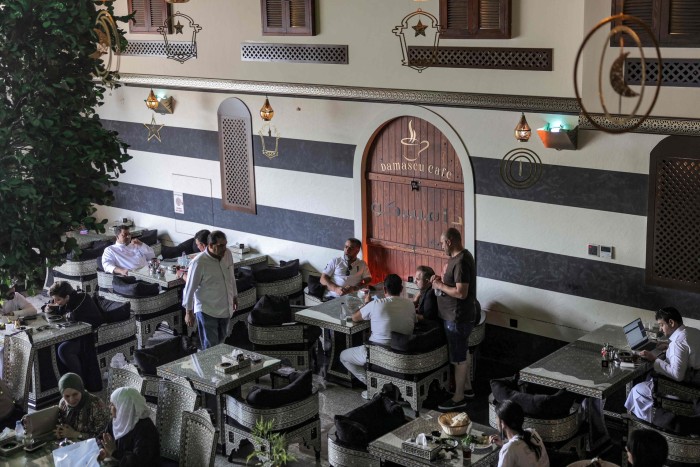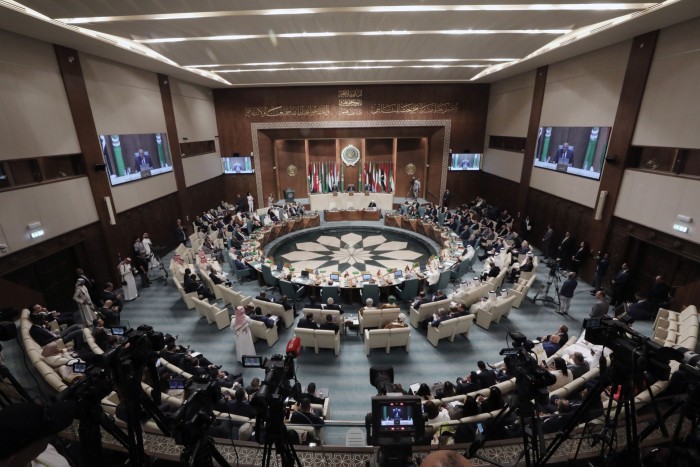Syrian president Bashar al-Assad was in Saudi Arabia on Friday to attend an Arab League summit as regional leaders edge towards normalising relations more than a decade after isolating Damascus following the regime’s violent crackdown on a popular uprising that triggered a civil war.
In a sign of shifting regional priorities, Arab states have stepped up their re-engagement with Assad in the hope that they can coax him into taking action on issues that have rippled across borders, including the plight of millions of refugees and a multibillion-dollar illicit drugs trade.
As part of the diplomatic push led by Saudi Arabia, Arab states plan to implement a scheme to encourage refugees to go home and convince western powers to ease sanctions on the pariah state.
The plan was adopted at a meeting of the Syrian, Saudi, Egyptian, Jordanian and Iraqi foreign ministers last month, shortly before Arab states agreed to readmit Syria into the Arab League, 12 years after suspending the state.

The diplomats hope that, if successful, the refugee scheme will encourage more Syrians to go home and enable Arab states to convince the US and Europe to ease sanctions to help with reconstruction in the war-devastated nation.
The scheme was being discussed at the “highest levels” at the UN, according to two people familiar with the matter. But they also said there were internal divisions about the plan because of its reliance on security guarantees from Damascus and potential to encourage the forced returns of some refugees.
About 6mn Syrians fled the country after civil war broke out 12 years ago, and a similar number were displaced, as the Damascus regime, backed by Iran and Russia, brutally crushed the rebellion and regained control over much of the country.
The moves to re-engage the regime have raised concerns among human rights advocates that the refugee scheme, first floated by Jordan about two years ago but delayed by pressure from Washington and other western capitals, could become reality, despite concerns about the safety of returnees.
“Any premature organised returns before the appropriate conditions are met risk setting a dangerous precedent,” said Emma Beals, non-resident fellow at the Middle East Institute, adding that it could give cover for countries hosting Syrian refugees in the region and Europe to return them.
Previous attempts to return displaced Syrians to areas under regime control have led to allegations of abuses. Although active conflict has reduced in Syria, rights groups have consistently documented arrests, enforced disappearances, conscription and persecution of returnees. Some returnees have also been blocked from going to their home areas or forced into government-run makeshift shelters controlled by security forces.

UN agencies have also consistently been blocked from monitoring those returns, aid workers say. Aid workers and some diplomats are sceptical that the Assad regime is willing to alter its behaviour.
“The regime has not changed its fundamental behaviour and continues to use violence and the pervasive security apparatus to target those it views as a threat, including returnees,” Beals said.
Arab diplomats said the refugee scheme was a way to test if Assad was serious and could be trusted to make reforms. They also insisted that those backing the move had not discussed economic aid with Damascus and want to first see progress on the refugee issue.
“The Syria government will respond to what was agreed to [and] then we will assess. There’s a view that the government in Syria is not sincere, is not serious, but the only way to test that seriousness is through this meaningful process,” said a diplomat. “Otherwise how would you be able to test it?”
Only small numbers of refugees have returned as many are fearful of their safety, as well as being wary of what they would return to, with massive destruction and an economy in collapse.
While the majority, almost 4mn, are in Turkey, hundreds of thousands are in Jordan and Lebanon, where they are increasingly viewed as a burden on weak economies. Lebanon has expelled “hundreds” of Syrian refugees in recent weeks, according to 20 rights group.
As well as concerns about refugees, regional powers have been increasingly worried about the cross-border trafficking of captagon, a highly addictive amphetamine that has become a vital source of foreign currency for Damascus. They are hoping that by engaging Assad, the regime will become more willing to take action to curb the trade.
Arab diplomats said they have been discussing their plans with western powers, but would not lobby to ease sanctions until they see progress. “This is an Arab-led effort in co-ordination with the UN and international stakeholders; it has to be assessed at one point in time, then we take it from there,” a diplomat said.
Stay connected with us on social media platform for instant update click here to join our Twitter, & Facebook
We are now on Telegram. Click here to join our channel (@TechiUpdate) and stay updated with the latest Technology headlines.
For all the latest Business News Click Here
For the latest news and updates, follow us on Google News.
